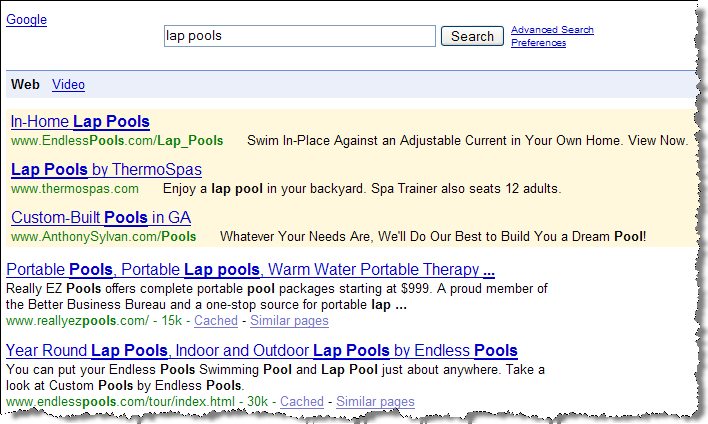Expressing an effective value proposition is one of the biggest keys to conversions. So it’s no surprise that it was a popular topic on day one of our Landing Page Optimization Workshop.
Problem: Most companies still struggle with value propositions.
This is fertile ground for optimization, and we’ll continue to cover it in more depth in our clinics and workshops. But for this post, I want to focus on a distinction that can help clarify two different types of value proposition — and provide compelling tests that you might run with PPC ads, landing pages, SEO, and other marketing channels.

As the image above illustrates, you can focus your value proposition on your company, or on your specific product or service.
In this example, a search for “lap pools” shows the PPC ads and organic search results include a mix of both styles. (Note: What the image doesn’t show is that all of the sidebar PPC ads use product-centric value propositions.)
What’s the difference between types of value propositions, and why is it important?
Product-centric value propositions and company-centric value propositions appeal to different types of searchers, with different motivations and purchase intentions.
So the style you present in your various marketing channels should match the mindset of the prospects in that channel.
In a search for “lap pool”, the copy from the second PPC ad states: “Enjoy a lap pool in your backyard. Spa Trainer also seats 12 adults.” This line focuses exclusively on the product features.
But the copy from the third ad states: “Whatever Your Needs Are, We’ll Do Our Best to Build You a Dream Pool!” In contrast, this copy is all about the company and the lengths it will go to for customer service.
Tailor your value proposition to the fit the searcher
Each of those approaches is likely to appeal to a certain type of users. In many cases, the copy that is product-specific will appeal to prospects just starting their search. Once the prospect has zeroed in on the product he or she wants, their search may shift to other factors, such as customer service or installation options. At that point, the company-centric copy becomes more valuable to the decision.
This works with SEO, too. Look at the top organic result for that search — it’s another company-centric value proposition: “Really EZ Pools offers complete portable pool packages starting at $999. A proud member of the Better Business Bureau and a one-stop source for portable lap …”
The second organic result is product-focused: “You can put your Endless Pools Swimming Pool and Lap Pool just about anywhere. Take a look at Custom Pools by Endless Pools.”
Identify the right style to use with your search campaigns
Can we tell you which style will win hands-down every time? Of course not.
That’s why you should be testing this with your own products/services, customers, and marketing channels. Especially if your PPC ad or SEO results are surrounded by a bunch of similarly focused (and struggling) value propositions.
This is a powerful way to test how your value proposition sets apart your offer and connects with the right prospects, in the right way, at the right time.
Have you tested similar variations with your PPC ads, landing pages, or SEO? Let us know. And look for more on value propositions, including a contest, in the near future …




The src attribute for the image at the beginning of this entry appears to be incorrect.
Thanks for the heads up. I’ve replaced the straggler image (it was lost in the migration to WordPress) and plugged a few subheads into the post to make it a bit more reader-friendly. Let us know if you run any tests like this with your value propositions.
What a super blog!
Three questions:
1. What is the difference between Strategy and Value Proposition?
2. Is one the pre-cursor of the other (define VP first, the match strategy to defined VP)? Put differently can you talk of Strategy without talking of VP and vice-versa?
3. Companies usually have by-lines (Lexus – ‘In persuit of excellence’) – is this the value proposition?